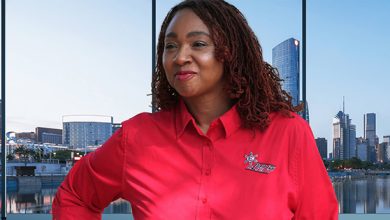In Utah, here’s what Black-owned Redemption Bank will offer customers
When Jaime and Michael Hansen were in their 20s, their dream was to buy the furniture business where Michael was working.
“We met with these different bankers and they made it sound like it was this difficult, daunting process,” Jaime Hansen said. “It was kind of frustrating to figure out how to navigate everything.”
That changed when they found Traci Flynn, senior loan officer at Holladay Bank & Trust. Today, after three loans for purchases and expansion, the Hansens operate Best Deal Mattress & Furniture from an 18,000-square-foot building in Orem.
“She helped us through every step,” Jaime Hansen said. “When we list the people that were most influential in helping our business succeed, Traci is right there at the top.”
Holladay Bank is now officially Redemption Bank, the first Black-owned financial institution in the Rockies.
Redemption will continue to be flexible when it comes to approving loans for Utah’s small businesses, said West Martin, its chief credit officer — as it expands its lending, transforms its digital presence and reaches out to minority communities that have not had access to or felt comfortable with financial services.
Ashley Bell, CEO of Redemption Holding Company, which purchased Holladay Bank, eventually wants it to serve Americans nationwide. But for now, he said, its focus will be on Utah.
(Ashley Bell) Ashley Bell is chairman and CEO of Redemption Holding Company, a Black-owned holding company formed to purchase Holladay Bank & Trust. While he plans for the new Redemption Bank to eventually serve customers nationwide, its focus for now will be on Utah, he said.
“I think that there are a lot of overlooked communities in Utah that need and deserve to have a bank on their side, that is understanding of their challenges,” Bell said.
“Our biggest segment of our customers is going to be those people who come up with good ideas to serve their communities, to create economic opportunity in those communities and create jobs,” he said. “And our goal is to help them become economically resilient.”
In less than three months, the new bank has approved loans of over $13 million and almost reached its 12-month deposit projections, said Bruce Jensen, a longtime banker in Utah who is now Redemption’s CEO.
(Francisco Kjolseth | The Salt Lake Tribune) Bruce Jensen, CEO of Redemption Bank, stands in the bank in Holladay. The new Black-owned bank will offer expanded loan programs and a stronger online presence, he said.
Familiar and new faces
All of Holladay Bank’s staff decided to stay on, Jensen said. Some of the first additional hires are bringing expertise in government-backed loans.
The bank also intends to hire more diverse employees, he said, “so that people who are minorities will feel like, ‘Hey, we are being able to talk to people who understand us.’ We are trying to represent the ownership of the bank and the vision and hopes that they have, and bringing in people that represent, reflect the social impact goals that we have.”
Expanded lending
Jensen said the bank will continue to serve the Holladay community and will keep the products and services it had prior to the change in ownership.
At the same time, “we will differentiate ourselves in providing some additional value to both shareholders and to the public at large,” Jensen said. “We would be expanding what we are doing on the lending side.”
(Francisco Kjolseth | The Salt Lake Tribune) West Martin is chief credit officer of Redemption Bank in Holladay. He said the new bank will expand its loan offerings beyond what was offered by Holladay Bank & Trust, which it recently acquired.
Martin said the bank will add government-guaranteed loans to the bank’s portfolio — like Small Business Administration 7A and 504 loans.
SBA 7A loans are more flexible, allowing business owners to use the loan as working capital, inventory or real estate. The 504 loans are mainly for fixed funding assets, like real estate and equipment.
Redemption is the only Black-owned bank in the country that has an in-house team handling SBA loans, Bell noted at its ribbon-cutting ceremony Wednesday.
Redemption also plans to work with Utah’s Small Business Credit Initiative, a program created by the Governor’s Office of Economic Opportunity.
Investing in mortgages
Redemption will focus on commercial banking to start, but will consider offering consumer loans and residential mortgages in the future, Jensen said. In the meantime, the bank started working with Wall Street companies and invested in LMI loans — low-to-moderate income loans.
Buying those securities, Martin explained, helps serve the communities that depend on the bank’s success; it makes more funding available in the market for new loans to LMI borrowers.
“We have invested $1.5 million into mortgage-backed securities that are to Salt Lake County residents that fit that LMI definition,” Martin said. “We are in the process of buying another $1 million of those loans.”
A digital transformation
Redemption hired a Utah technology company to expand the bank’s digital platform, adding options like mobile deposit. Customers who don’t live near Holladay will be “able to open accounts seamlessly” online, Jensen said.
“We are also going to be offering an account aggregation element,” Jensen said, so customers “will be able to move their money very easily between our bank and their other institutions.”
A “huge part” of the new digital platform will be the financial literacy portal, which is still in “the formative stage,” he added. The bank has talked to specialists and “all the major universities in the state,” and plans to offer live-streamed workshops, he said.
The improvements will continue as Redemption morphs into a “more of a national provider” in the future.
A bank for everyone
Redemption wants to be inclusive, Jensen said, serving everyone while also building relationships in Utah’s Black and other minority communities.
In the last two years, while Redemption Holding Company was negotiating the acquisition of Holladay Bank, bank officials did outreach. They met with Rep. Sandra Hollins, D-Salt Lake City, and her constituents, talked to pastors of Black churches and started working with the Black Chamber of Commerce.
The bank’s intention, he said, is to create a “symbiotic relationship” with the community. While he wants customers to reach out for financial advice, help and solutions, he also plans to have his team out in the field to talk to people directly.
Minority communities “don’t want us to sit in an ivory tower,” Jensen said. “They want us to come to them and we want to be able to come to them. We want to meet their needs.”
Reaching new residents
(File photo courtesy of Salt Lake County) Ze Min Xiao, second from left, when she worked in the Salt Lake County Mayor’s Office of New Americans. She’s now president and CEO of the Center for Economic Opportunity & Belonging — a Salt Lake City organization focused on helping refugees and immigrants.
The bank also reached out to refugees and immigrants, said Ze Min Xiao, president and CEO of the Center for Economic Opportunity & Belonging — a Salt Lake City organization focused on helping those communities.
“Many times refugees and immigrants alike have strong entrepreneurial spirit,” Xiao said. “So it’s exciting to hear that there is a bank that is targeting and tailoring to find ways to work with individuals who are trying to establish their financial capacity.”
Jamaica Trinnaman, senior business coordinator with the International Rescue Committee, hasn’t yet talked with Redemption Bank. Her West Valley City organization provides opportunities for refugees, asylum seekers and other immigrants, and she hopes it will be creative in assessing who qualifies for loans.
She often hears about people asking banks “point-blank,” she said, “‘Is the color of my skin going to be a barrier in getting this loan?’ And the answer is always no. ‘We don’t even take that into account.’”
“But I struggle with that response because really, it’s sort of already baked into that equation,” she said. “Do they have their own home? Do they have a two-income household? Do they have an existing business that’s profitable? And if they say no to all three of those, then the chances of them getting good funding is very limited.”




